Channels of Distribution International Distribution Direct & Indirect



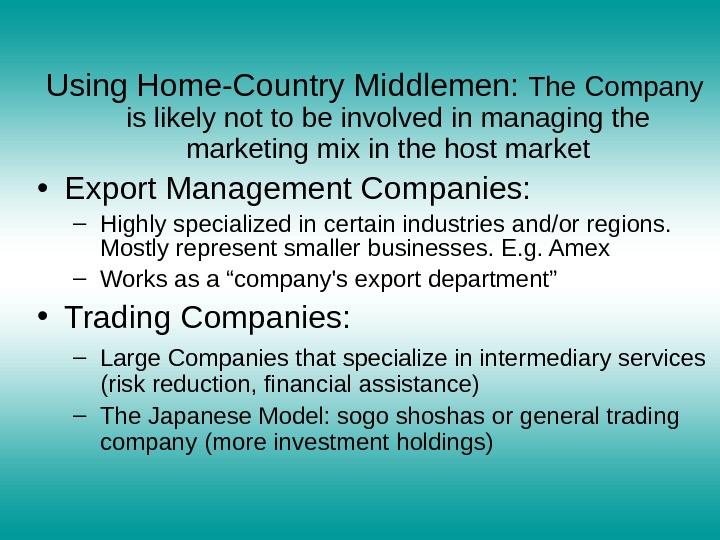

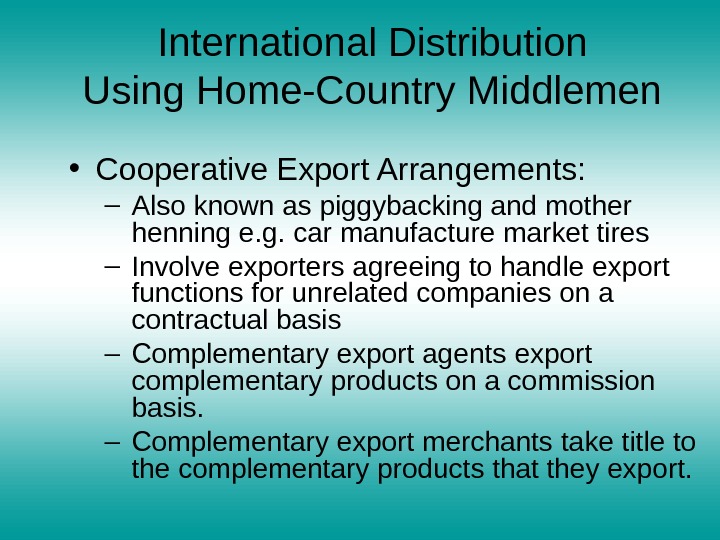


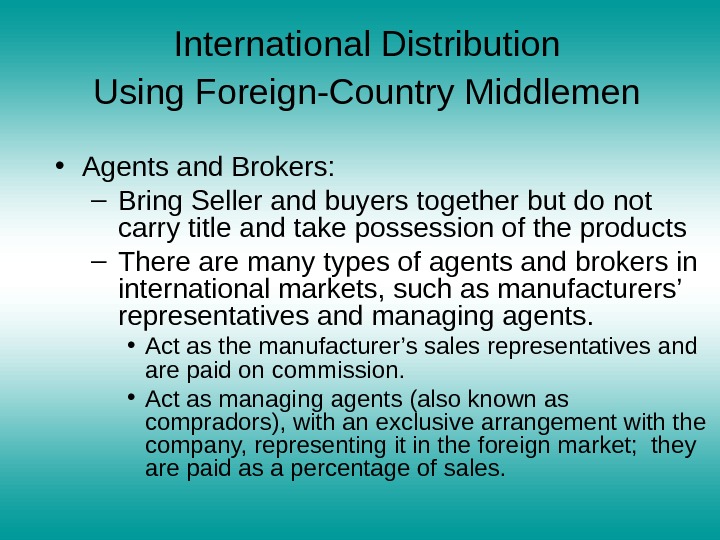

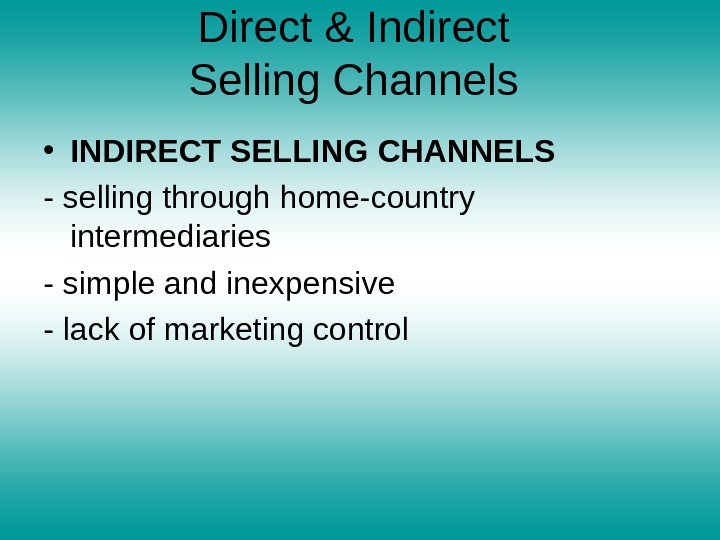
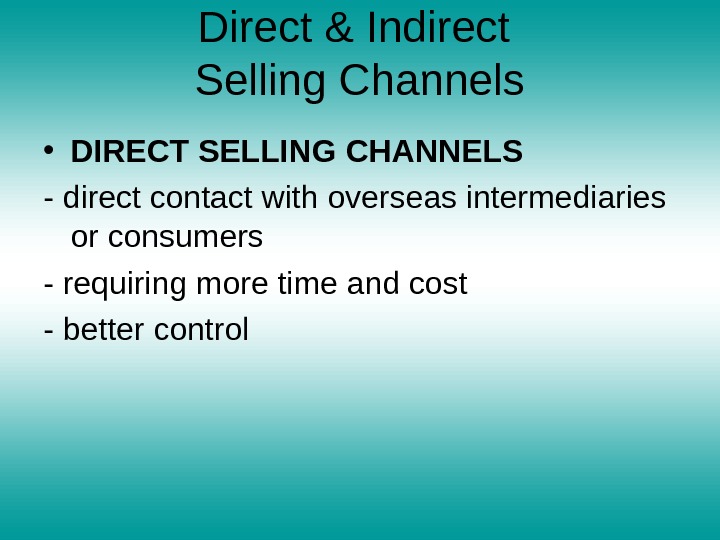
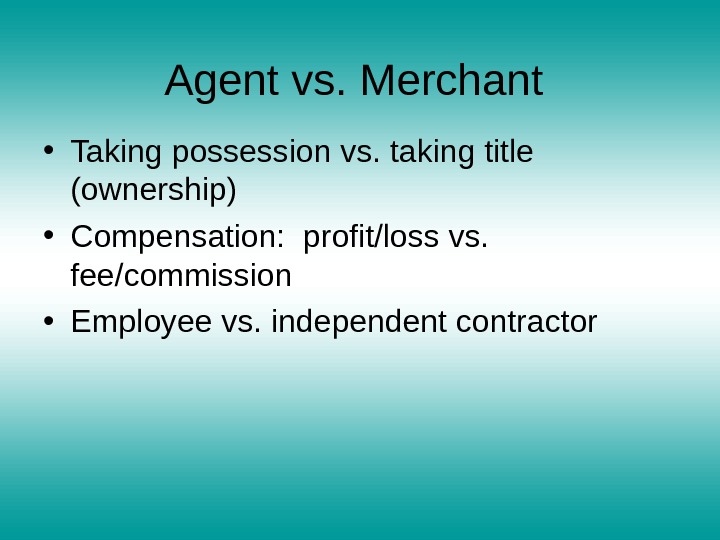
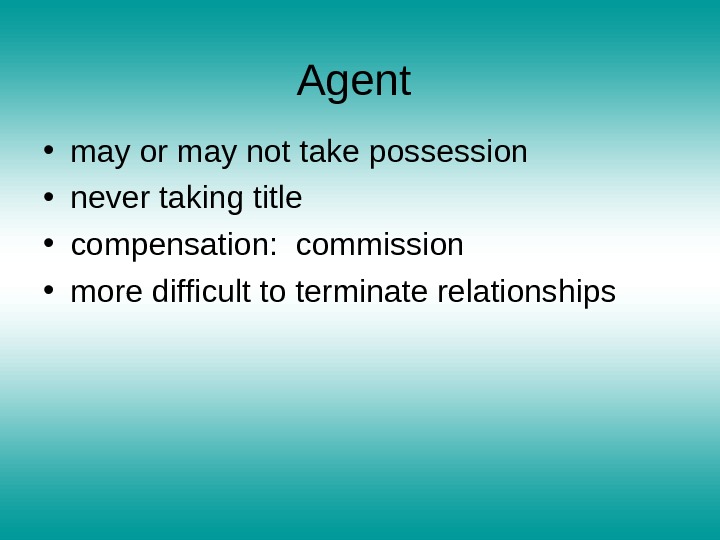

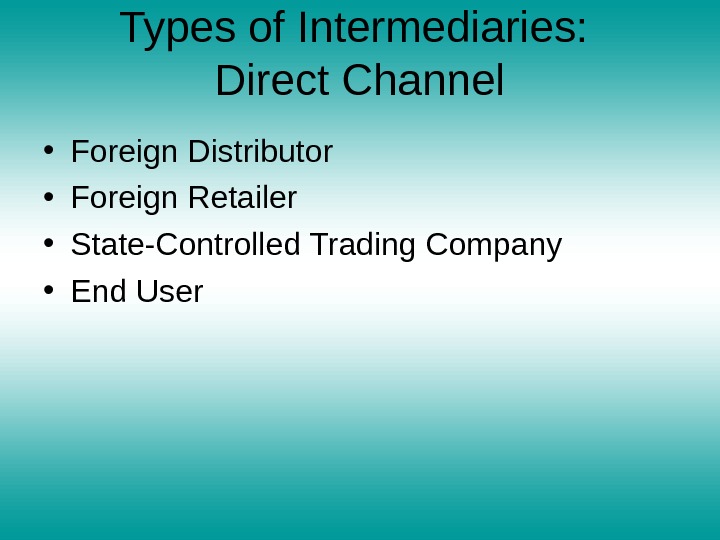

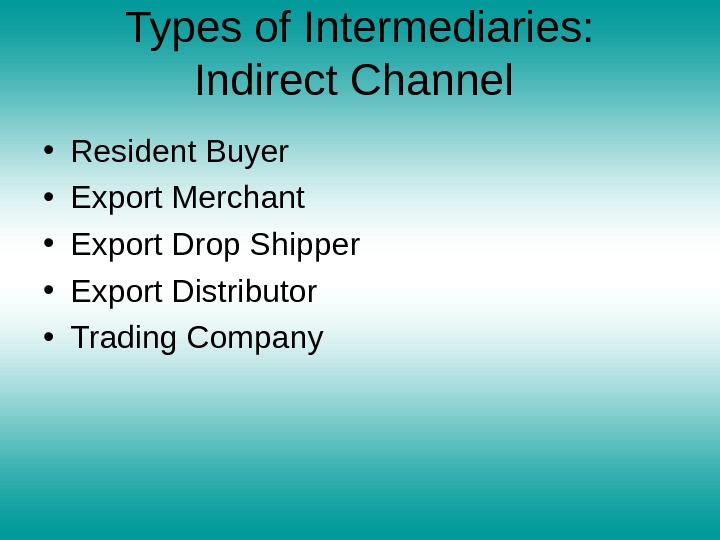
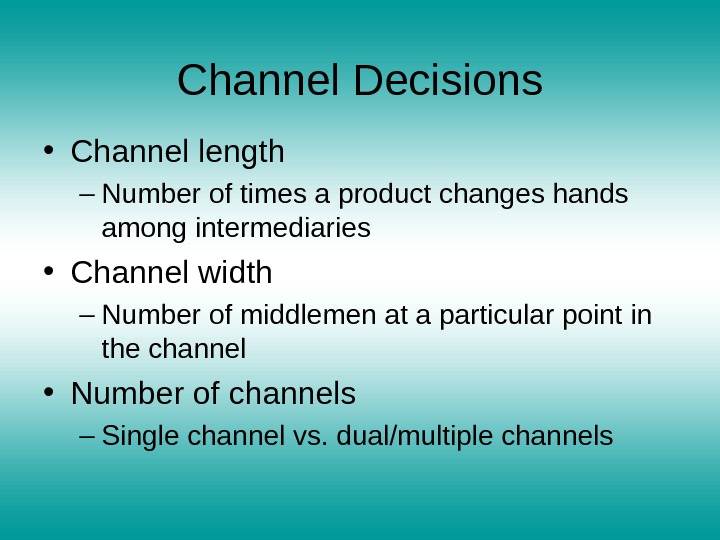



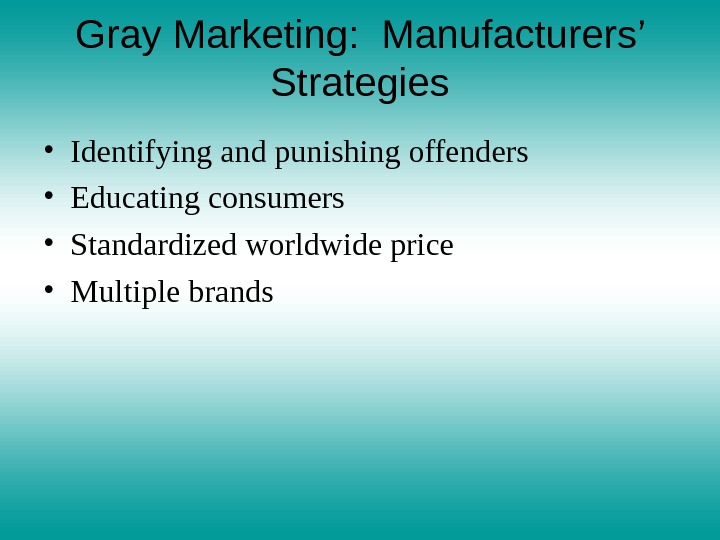


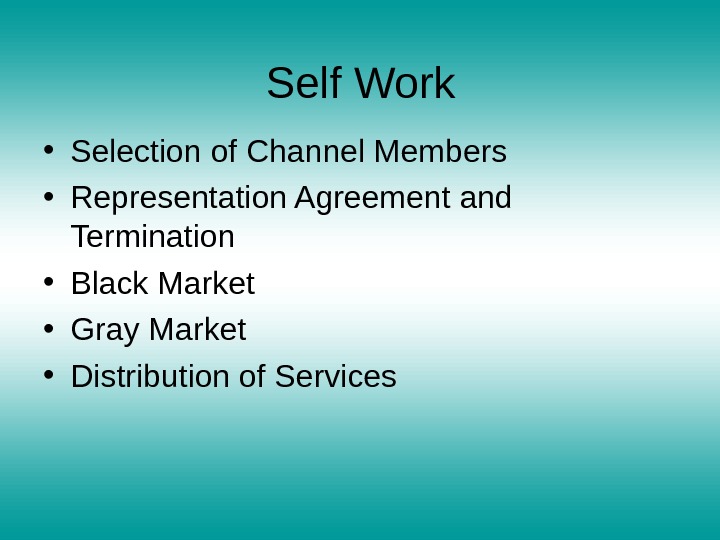
06_03_13_channels_of_distribution.ppt
- Размер: 144.5 Кб
- Количество слайдов: 25
Описание презентации Channels of Distribution International Distribution Direct & Indirect по слайдам
 Channels of Distribution International Distribution Direct & Indirect Selling Channels Types of Intermediaries
Channels of Distribution International Distribution Direct & Indirect Selling Channels Types of Intermediaries
 Issues Related to International Distribution • Using Established Channels: Channels that already exits – Could charge high prices – Could be blocked by competition – Channel partnership is a long-term decision: Company may be bound indefinitely to the channel choice. • Building Own Channels: – Necessary if there are no channels/ or existing channels do not conform to company needs. – Expensive – Time-consuming
Issues Related to International Distribution • Using Established Channels: Channels that already exits – Could charge high prices – Could be blocked by competition – Channel partnership is a long-term decision: Company may be bound indefinitely to the channel choice. • Building Own Channels: – Necessary if there are no channels/ or existing channels do not conform to company needs. – Expensive – Time-consuming
 Using Home-Country Middlemen: The Company is likely not to be involved in managing the marketing mix in the host market • Export Management Companies: – Highly specialized in certain industries and/or regions. Mostly represent smaller businesses. E. g. Amex – Works as a “company’s export department” • Trading Companies: – Large Companies that specialize in intermediary services (risk reduction, financial assistance) – The Japanese Model: sogo shoshas or general trading company (more investment holdings)
Using Home-Country Middlemen: The Company is likely not to be involved in managing the marketing mix in the host market • Export Management Companies: – Highly specialized in certain industries and/or regions. Mostly represent smaller businesses. E. g. Amex – Works as a “company’s export department” • Trading Companies: – Large Companies that specialize in intermediary services (risk reduction, financial assistance) – The Japanese Model: sogo shoshas or general trading company (more investment holdings)
 International Distribution Using Home-Country Middlemen • Home-Country Brokers and Agents: – Middlemen who bring international buyers and sellers together in the company’s home country. – Do not carry title to the product/ commission based – Manufacturer’s export agent: represent a manufacturer – Buying offices: buyers located in the firm’s home country, representing different international firms
International Distribution Using Home-Country Middlemen • Home-Country Brokers and Agents: – Middlemen who bring international buyers and sellers together in the company’s home country. – Do not carry title to the product/ commission based – Manufacturer’s export agent: represent a manufacturer – Buying offices: buyers located in the firm’s home country, representing different international firms
 International Distribution Using Home-Country Middlemen • Cooperative Export Arrangements: – Also known as piggybacking and mother henning e. g. car manufacture market tires – I nvolve exporters agreeing to handle export functions for unrelated companies on a contractual basis – Complementary export agents export complementary products on a commission basis. – Complementary export merchants take title to the complementary products that they export.
International Distribution Using Home-Country Middlemen • Cooperative Export Arrangements: – Also known as piggybacking and mother henning e. g. car manufacture market tires – I nvolve exporters agreeing to handle export functions for unrelated companies on a contractual basis – Complementary export agents export complementary products on a commission basis. – Complementary export merchants take title to the complementary products that they export.
 International Distribution Using Home-Country Middlemen • Export merchants: – Intermediaries who take title to and possession of the products they carry. – Responsible for shipping and marketing the products in the target market. – Carry competing brands – Examples: — Export jobber, who carries commodity goods, but does not take physical possession of the goods. — Norazi agent, who deals in illegal and/or gray market products.
International Distribution Using Home-Country Middlemen • Export merchants: – Intermediaries who take title to and possession of the products they carry. – Responsible for shipping and marketing the products in the target market. – Carry competing brands – Examples: — Export jobber, who carries commodity goods, but does not take physical possession of the goods. — Norazi agent, who deals in illegal and/or gray market products.
 International Distribution Using Foreign-Country Middlemen Using Host-Country Middlemen: The Company is likely to have a presence in the host country • Merchant Middlemen: – Intermediaries who carry the manufacturer’s product line in a particular country. – Usually carries title to and has physical possession of the products.
International Distribution Using Foreign-Country Middlemen Using Host-Country Middlemen: The Company is likely to have a presence in the host country • Merchant Middlemen: – Intermediaries who carry the manufacturer’s product line in a particular country. – Usually carries title to and has physical possession of the products.
 International Distribution Using Foreign-Country Middlemen • Agents and Brokers: – Bring Seller and buyers together but do not carry title and take possession of the products – There are many types of agents and brokers in international markets, such as manufacturers’ representatives and managing agents. • Act as the manufacturer’s sales representatives and are paid on commission. • Act as managing agents (also known as compradors), with an exclusive arrangement with the company, representing it in the foreign market; they are paid as a percentage of sales.
International Distribution Using Foreign-Country Middlemen • Agents and Brokers: – Bring Seller and buyers together but do not carry title and take possession of the products – There are many types of agents and brokers in international markets, such as manufacturers’ representatives and managing agents. • Act as the manufacturer’s sales representatives and are paid on commission. • Act as managing agents (also known as compradors), with an exclusive arrangement with the company, representing it in the foreign market; they are paid as a percentage of sales.

 Direct & Indirect Selling Channels • INDIRECT SELLING CHANNELS — selling through home-country intermediaries — simple and inexpensive — lack of marketing control
Direct & Indirect Selling Channels • INDIRECT SELLING CHANNELS — selling through home-country intermediaries — simple and inexpensive — lack of marketing control
 Direct & Indirect Selling Channels • DIRECT SELLING CHANNELS — direct contact with overseas intermediaries or consumers — requiring more time and cost — better control
Direct & Indirect Selling Channels • DIRECT SELLING CHANNELS — direct contact with overseas intermediaries or consumers — requiring more time and cost — better control
 Agent vs. Merchant • Taking possession vs. taking title (ownership) • Compensation: profit/loss vs. fee/commission • Employee vs. independent contractor
Agent vs. Merchant • Taking possession vs. taking title (ownership) • Compensation: profit/loss vs. fee/commission • Employee vs. independent contractor
 Agent • may or may not take possession • never taking title • compensation: commission • more difficult to terminate relationships
Agent • may or may not take possession • never taking title • compensation: commission • more difficult to terminate relationships
 Merchant • may or may not take possession • always taking title • compensation: profit/loss • easier to terminate relationships
Merchant • may or may not take possession • always taking title • compensation: profit/loss • easier to terminate relationships
 Types of Intermediaries: Direct Channel • Foreign Distributor • Foreign Retailer • State-Controlled Trading Company • End User
Types of Intermediaries: Direct Channel • Foreign Distributor • Foreign Retailer • State-Controlled Trading Company • End User
 Types of Intermediaries: Indirect Channel • Export Broker • Manufacturer’s Export Agent or Sales Representative • Export Management Company (EMC) • Cooperative Exporter • Purchasing/Buying Agent • Country-Controlled Buying Agent
Types of Intermediaries: Indirect Channel • Export Broker • Manufacturer’s Export Agent or Sales Representative • Export Management Company (EMC) • Cooperative Exporter • Purchasing/Buying Agent • Country-Controlled Buying Agent
 Types of Intermediaries: Indirect Channel • Resident Buyer • Export Merchant • Export Drop Shipper • Export Distributor • Trading Company
Types of Intermediaries: Indirect Channel • Resident Buyer • Export Merchant • Export Drop Shipper • Export Distributor • Trading Company
 Channel Decisions • Channel length – Number of times a product changes hands among intermediaries • Channel width – Number of middlemen at a particular point in the channel • Number of channels – Single channel vs. dual/multiple channels
Channel Decisions • Channel length – Number of times a product changes hands among intermediaries • Channel width – Number of middlemen at a particular point in the channel • Number of channels – Single channel vs. dual/multiple channels
 Determinants of Channel Types • Legal Requirements • Product Image • Product Characteristics • Middlemen’s Loyalty and Conflict • Local Customs • Power and Coercion • Control
Determinants of Channel Types • Legal Requirements • Product Image • Product Characteristics • Middlemen’s Loyalty and Conflict • Local Customs • Power and Coercion • Control
 Representation Agreement and Termination • paying attention to agency termination laws • having agreements in writing • avoiding evergreen contract
Representation Agreement and Termination • paying attention to agency termination laws • having agreements in writing • avoiding evergreen contract
 Gray Market • Causes – Price differential • Legal Dimension – Protecting independent U. S. trademark owner • Ethical Dimension • Product Quality
Gray Market • Causes – Price differential • Legal Dimension – Protecting independent U. S. trademark owner • Ethical Dimension • Product Quality
 Gray Marketing: Manufacturers’ Strategies • Identifying and punishing offenders • Educating consumers • Standardized worldwide price • Multiple brands
Gray Marketing: Manufacturers’ Strategies • Identifying and punishing offenders • Educating consumers • Standardized worldwide price • Multiple brands
 Self Work • Direct and Indirect Selling Channels • Types of Intermediaries: Direct Channel • Types of Intermediaries: Indirect Channel • Channel Development • Channel Adaptation • Channel Decisions
Self Work • Direct and Indirect Selling Channels • Types of Intermediaries: Direct Channel • Types of Intermediaries: Indirect Channel • Channel Development • Channel Adaptation • Channel Decisions
 • Determinants of Channel Types — Legal Requirements — Product Image — Product Characteristics — Middlemen’s Loyalty and Conflict — Local Customs — Power and Coercion — Control Self Work
• Determinants of Channel Types — Legal Requirements — Product Image — Product Characteristics — Middlemen’s Loyalty and Conflict — Local Customs — Power and Coercion — Control Self Work
 • Selection of Channel Members • Representation Agreement and Termination • Black Market • Gray Market • Distribution of Services Self Work
• Selection of Channel Members • Representation Agreement and Termination • Black Market • Gray Market • Distribution of Services Self Work

